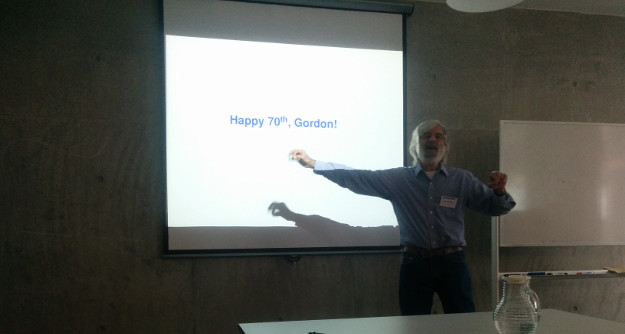GDP70

Today is Gordon Plotkin's 70th birthday! The Laboratory for Foundations of Computer Science at the University of Edinburgh held an event in his honour today to celebrate his birthday. It was a full day of talks by friends, colleagues, and former students of Gordon's.
There is absolutely no doubt that Gordon is my favourite computer scientist. Gordon has made numerous contributions to computer science, and I have been exposed to many of them throughout my undergraduate and postgraduate studies. In fact, my current research topic comes from his line of work. Therefore I am also deeply grateful to be able to take part in the celebration of him on his 70th birthday.
The line up of speakers was rather impressive. There were nine speakers, including Turing-award winning Leslie Lamport. The speakers and their respective talk titles:
- Phil Scott, "Some Recent Directions in MV and Effect Algebras".
- Eugenio Moggi, "Models, Over-approximations and Robustness".
- Philippa Gardner, "Reasoning about Concurrent Programs".
- Peter D. Mosses, "Modular SOS for Control Operators".
- Leslie Lamport, "It Isn't So Hard to Prophesize".
- Paul Blain Levy, "Trace semantics of well-founded processes via commutativity".
- Glynn Winskel, "Strategies with Parallel Causes".
- Bob Harper, "Computational Higher Type Theory".
- Marcelo Fiore, "An Algebraic Combinatorial Approach to Abstract Syntax of Opetopic Structures".
Abstracts (and some slides) for the talks are available at the programme site. Obviously, these speakers are amongst the heavyweight champions of theoretical computer science research. For a featherweight researcher, like myself, it has been incredibly inspiring to meet them all. In particular, I am happy to have met Bob Harper, whom I have wanted to meet for some time now. We talked a little bit about my research, and he gave me some suggestions for future work to look into. We also got to talk about his book "Practical Foundations for Programming Languages" and briefly about "real" programming languages (read: Standard ML).
In addition, I also got the chance to meet and speak with Alex Simpson, Martin Hofmann, Randy Pollack, and John Power to whom you can also draw lines back to from my current research. He kindly gave me some academic advice, but also travel advice for my upcoming trip to Japan.
It has been a thoroughly enjoyable day. I left after the last talk, but before leaving I gave Gordon my personal congratulations and wished him delightful evening.